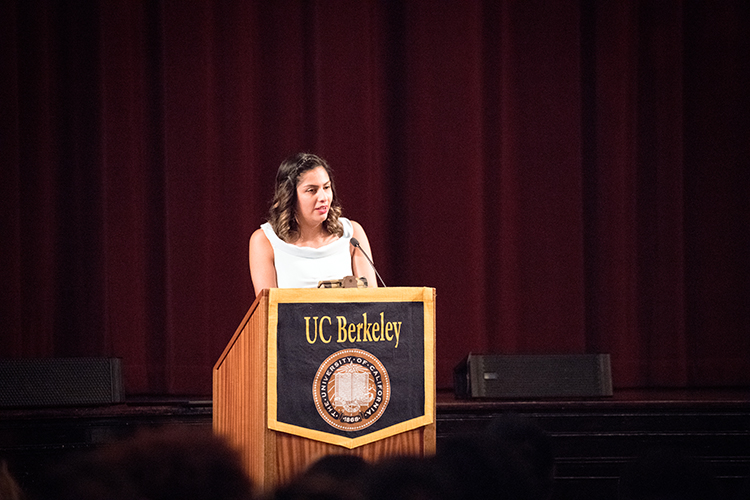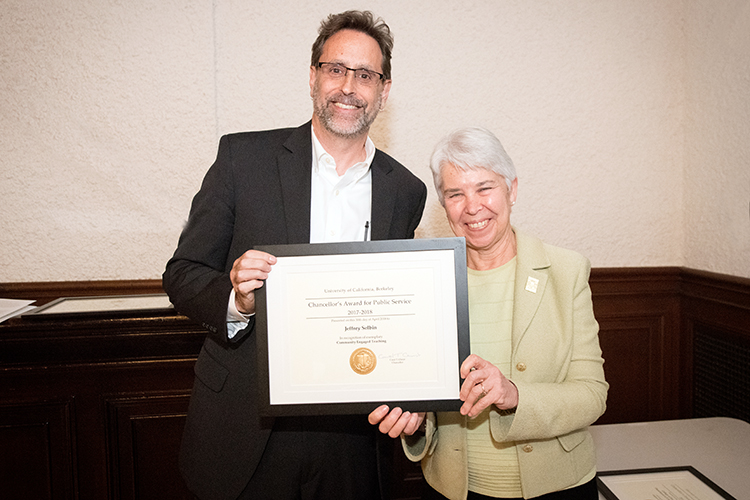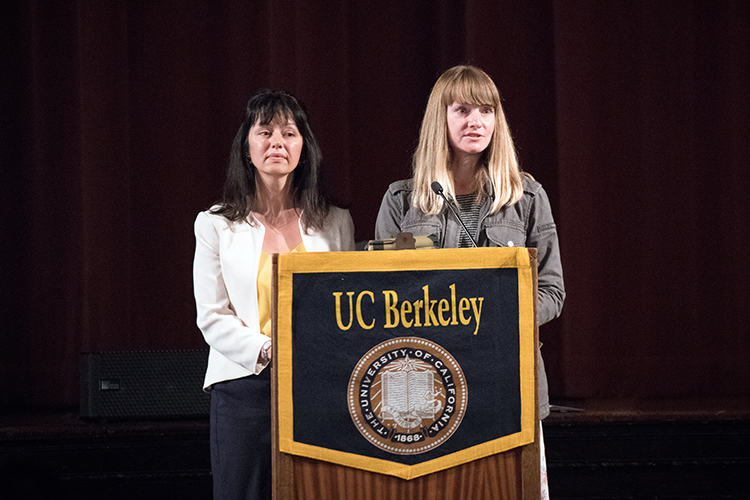Chancellor honors students, staff and faculty committed to public service

May 1, 2018

Chancellor Carol Christ stands with the 2018 award winners. (UC Berkeley photos by Keegan Houser)
Among this year’s winners of Berkeley’s prestigious Awards of Public Service are the Cal Veterans student group whose members volunteered to help people who lost their homes during the North Bay wildfires, an undergraduate student who figured out a new way for social workers to help disadvantaged communities and two staffers who launched a civic-action email list.
The award recognizes students, staff and faculty who embody UC Berkeley’s tradition of public service.
“These efforts have also reaffirmed the notion that uniting scholarship with action to make the world a better place is an essential element of the Berkeley educational model,” Chancellor Carol Christ said during the awards ceremony Monday. “It is in our DNA.”
The winners are:

Cris Gomez, a member of Cal Veterans who is also a UC Berkeley graduate and campus counselor, listens to instructions on how to clean the bathroom while volunteering at a shelter in Santa Rosa on Friday. The student group rushed to aide those evacuated by the devastating wildfires. (UC Berkeley photo by Jeremy Snowden)
Student Group for Civic Engagement: Cal Veterans
Cal Veterans responded to the fires in Sonoma and Napa counties by raising funds, collecting supplies and using their collective experience to support the establishment of an emergency field hospital and to support the process of sanitizing shelters to prevent viral disease outbreaks. Further, one member of Cal Veterans made a documentary on the Deported Veterans Support House in Tijuana, which houses many veterans of the U.S. military who have been deported to Mexico. Group members have visited and delivered supplies, spending time with deported veterans, and they are raising funds for supplies to send and deliver to the veterans.

Brandon Doan stands with Chancellor Carol Christ.
Brandon Doan, winner of the Civic Engagement Award for undergraduate students
Doan worked with other students to co-found Highland Health Advocates, a safety net for low-income, underserved communities in the Bay Area which redesigns typical social work practices to integrate social workers with student volunteers, ER doctors and lawyers within the same hospital shift. Doan designed Health Advocates, as well as a corresponding app and a new DeCal course, to confront the social determinants of health that keep disadvantaged communities cycling into the emergency room. Doan has also volunteered with the Berkeley Free Clinic for years and serves as co-director of UC Teach in Prison, where students serve as tutors in San Quentin.

Yvonne Dorantes spoke after receiving the Mather Award.
Yvonne Dorantes, winner of the Mather Good Citizen Award
As a Haas Public Service Leader, Dorantes initiated and implemented a project called Training for Resource-Management, Environmentalism, Ecology, and Sustainability (T.R.E.E.S.), where she educates high school students, particularly students of color, on environmental injustice and how to get involved in environmental justice work. She also works as a college advisor for the Pre-College Trio Talent Search program, where she started two new partnerships with local high schools in an effort to increase the college-going rates within particular communities in Fruitvale and Oakland.

Kimberly Robledo was honored for her work with Rising Immigrant Scholars through Education.
Kimberly Robledo, winner of the Robert J. and Mary Catherine Birgeneau Award for Service to Undocumented Students
Robledo, a sophomore originally from Mexicali, Mexico, is a tireless advocate for undocumented students and the undocumented community since arriving at Berkeley. Through her engagement with student organizations such as Rising Immigrant Scholars through Education (RISE) and the Undocumented Students Coalition, Robledo has supported undocumented students in navigating the challenging circumstances they often face. Robledo also lives and works with other undocumented students through Casa Sin Fronteras, a program that helps Chicanx/Latinx undocumented students find affordable housing. Robledo has also organized two advocacy trips to Washington, D.C.

Katie Cruz stands with Christ.
Katie Cruz, winner of Robert J. and Mary Catherine Birgeneau Award for Service to Underrepresented Students
As part of a class, Cruz was introduced to La Clinica de la Raza, the East Bay’s largest provider of health and mental health care. Since then, her commitment to serving the community has gone far beyond class requirements as Cruz continues to volunteer with La Clinica to this day. Cruz went on to become a Behavioral Pathways Mentor, a program that provides underrepresented, first-generation, and predominantly immigrant high school students with weekly career-related lectures and workshops promoting higher education.

Derrika Hunt, a graduate student, was honored for her work with the Dreamers4Change Foundation.
Derrika Hunt, winner of the Civic Engagement Awards for graduate students
Hunt, a Ph.D. candidate at the Graduate School of Education, founded the Dreamers4Change Foundation with the intention of teaching girls and helping them to understand that they have something to teach the world. The foundation’s “Lemonade” workshop series centers on the experiences, voices and ideas of girls of color through creative expression. Another foundation program, Passports4Change, utilizes travel to explore how the intersections of race, class, gender and citizenship impact how black girls situate themselves in our global world. The program is rooted in the belief that low-income black girls have a great deal to gain from opportunities to experience contexts different from their own. She plans to lead a group to South America this summer.

Jeff Selbin, a professor at Berkeley Law, stands with Chancellor Carol Christ.
Jeff Selbin, winner of the Chancellor’s Faculty Community Award for Engaged Teaching
Jeff Selbin is clinical professor of law, faculty director at the Policy Advocacy Clinic and co-faculty director at the Thelton E. Henderson Center for Social Justice at Berkeley Law. Since 2009, Selbin has directed and overseen an effort to end the assessment of juvenile justice administrative fees that are charged to youth and families at all stages of the juvenile justice system. These cumulative and costly fees placed a significant financial burden on thousands of California’s most vulnerable families. The efforts of Selbin and his students directly led to the passage of Senate Bill 190, a law which ended the assessment of juvenile administrative fees in the California juvenile justice system.

Members of Resilient by Design Bay Area: Y-Plan Youth Challenge accept their award.
Resilient By Design Bay Area: Y-Plan Youth Challenge, winner of the Campus Community Partnership Award
Working with over 17 Bay Area high school and five elementary school classrooms, the Youth Challenge connects, Cal faculty and students, professional architects and planners, community organizations, and high school students by engaging students in the urban design process to address existential problems like climate change or rising seas.
The vast majority of students engaged in the Youth Challenge are from low income, minority communities. The aim is to prepare and empower young people to inform policy and interrupt patterns of neglect, while simultaneously guiding civic leaders to more successfully engage diverse young people in planning.

Berkeley staff members Amelia Miazad and Kara Ganter accept their award for starting an online community after the 2016 election.
Amelia Miazad and Kara Ganter, winner of the Civic Engagement Awards for staff
Shortly after the fractious 2016 election, Amelia Miazad and Kara Ganter launched Wall-of-Us, a civic action listserv and website. The initial mission was to provide a welcoming place that made it easy to find ways to take action in this new political reality. They carefully curate a set of potential actions based on their research as well the research of volunteers, and recommend to their network four civic actions average citizens can take each week to change policy.
Ken Goldberg, winner of an award recognizing faculty research in the public interest
Goldberg, a professor of industrial engineering and operations at the College of Engineering, and a team of postdoctoral, graduate and undergraduate students have spent the last four years developing the Collaborative Assessment and Feedback Engine (CAFE), an open source, e-participation platform that provides participants with dynamic visual feedback about their position on key social issues, applies statistical models and collaborative filtering to rapidly discover emerging trends as data is collected, and presents emerging insights back to participants and decision-makers in near real time.
The team has successfully implemented CAFE to address a variety of social issues, from the effectiveness of family planning measures in Uganda to the political context of midterm elections in Mexico. Altogether, the platform has gathered feedback from over 25,000 participants across four countries. By fostering open-ended dialogue and facilitating a more nuanced assessment of public opinion about complex issues, CAFE enables more informed organizational decisions while increasing participant engagement in decision-making processes.